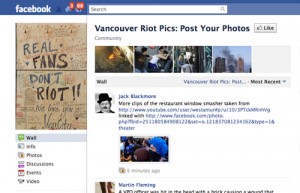Law Enforcement Likes Facebook
Posted on by Townsend Myers One of the unintended rewards of the Internet has been to allow us to watch stupid people do stupid things. A subset of this pleasure is we get to watch stupid criminals commit stupid crimes. It’s no surprise that law enforcement has decided to use this to their advantage, and is now using the web and social media to track down criminals. A perfect example is how the Vancouver police used Facebook to identify and arrest rioters after their hockey team lost this year’s Stanley Cup finals.
One of the unintended rewards of the Internet has been to allow us to watch stupid people do stupid things. A subset of this pleasure is we get to watch stupid criminals commit stupid crimes. It’s no surprise that law enforcement has decided to use this to their advantage, and is now using the web and social media to track down criminals. A perfect example is how the Vancouver police used Facebook to identify and arrest rioters after their hockey team lost this year’s Stanley Cup finals.
Minutes after the rioters began destroying the city’s downtown, Vancouver police set up a Facebook page asking people to submit pictures to help them identify the guilty. “We would like to encourage anyone that was involved in criminal misconduct in the events that occurred on June 15, 2011, to turn yourself in, instead of having to be tracked down, the alternative is much better then having yourself picked up in front of loved ones or at a work place,” the page says.
There has been no outcry about the Vancouver police using the social network to gather evidence, since all information was voluntarily provided by concerned citizens. But the issue of privacy is an important one, and it should be of big concern to us that the government is using social networks to gather information on people without their knowledge.
U.S. law enforcement agencies like the FBI, DEA and ICE are obtaining warrants to search Facebook accounts at an ever-increasing rate. These warrants request personal information and allow searches of the home pages of “friends” while also calling for the user’s “Neoprint” and “Photoprint” which provide information that the users themselves cannot access.
How has the law enforcement community, which is usually lagging when it comes to emerging technology, become so quickly savvy to the intricacies of social networking? Manuals explaining the terms and procedures for seeking warrants have been posted on public advocacy websites, apparently posted by Facebook themselves (which Facebook declines to confirm or deny).
If nothing else, television has taught us that prosecutors are required to disclose material evidence to a defendant. Or that the Fourth Amendment provides protection against unlawful search and seizure. A lesser-known fact: Congress passed legislation exempting both Facebook and the government from having to inform users that their personal information has been accessed. The Supreme Court has also weighed in, referencing their 1976 decision in United States v. Miller, which determined that once a person gives personal information to a third party such as a bank, or in our case a social network, then that information is now the property of the third entity and there is no legitimate claim from the individual to an “expectation of privacy.”
Constitutional lawyers argue that the scale of information on social networks is what distinguishes them from banks. We can only hope things change when the high court gets its first social networking appointment, which gives us a few decades to contemplate this issue.
As an FYI, Twitter and some other social media sites have a policy of notifying users when law enforcement asks to search their profile. Facebook does not.











